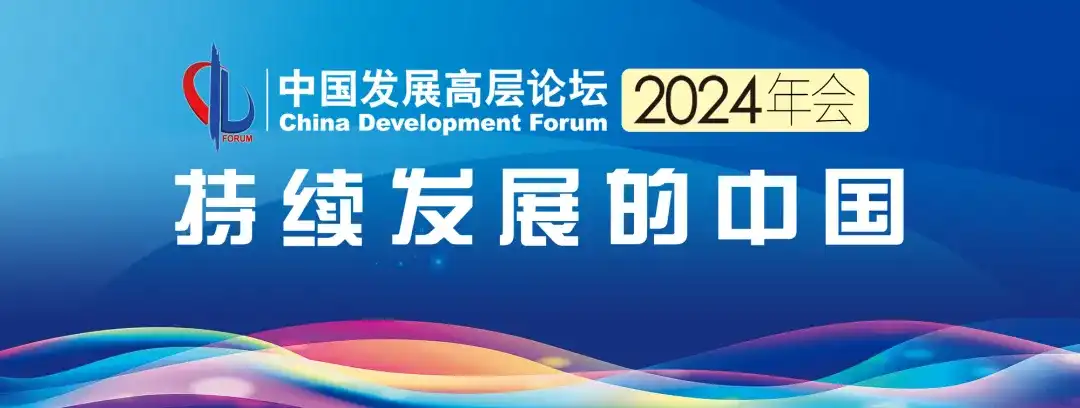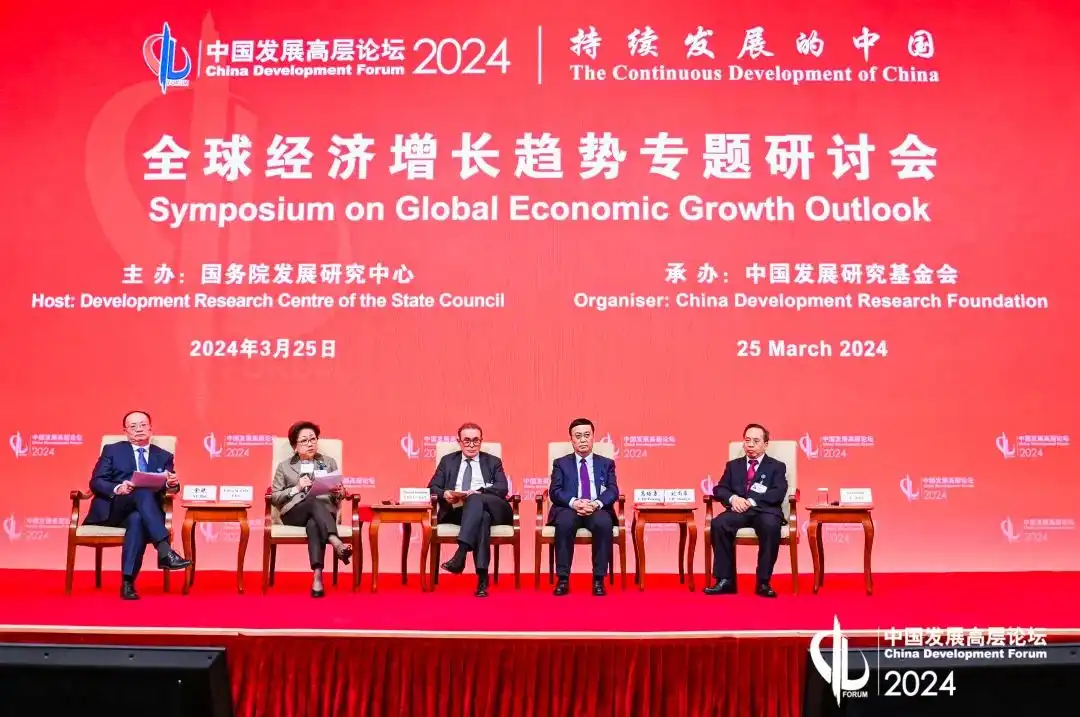Coordinate the expansion of domestic demand and deepen supply-side reforms to promote the continued expansion of consumption


■ China Economic Times reporter Zhao Shan
As the world's major economies recover and inflation gradually declines, global economic activity has shown greater resilience. However, affected by unfavorable factors such as geopolitical conflicts and trade protectionism, economic growth is still slow and uneven.
On March 25, at the symposium on "Global Economic Growth Trends" at the 2024 Annual Meeting of the China Development Forum, more than a dozen domestic and foreign guests launched a variety of topics such as global economic prospects and global economic governance cooperation. Various forms of discussion. Yu Bin, deputy director of the Development Research Center of the State Council, presided over this symposium.
Yang Weimin, member of the Standing Committee of the 13th National Committee of the Chinese People's Political Consultative Conference, deputy director of the Economic Committee, and former deputy director of the Office of the Central Financial and Economic Leading Group, gave a keynote speech on "coordinating the expansion of domestic demand and deepening supply-side structural reforms, and promoting consumption from post-epidemic recovery to continuous expansion." Yang Weimin said that at present and in the future, the main tone of China's macro policies is to combine expanding domestic demand with supply-side structural reforms. "We want to expand domestic demand, but not in isolation. We must target deep-seated structural problems, promote structural reforms, and promote the formation of a long-term mechanism for continued expansion of consumption." Yang Weimin said.
Yang Weimin said that around the formation of a long-term mechanism for continued expansion of consumption, China may coordinate and promote some measures and policies in seven aspects.
The first is to promote the reform of the income distribution system 。杨伟民指出,今年《政府工作报告》把多年来沿用的“居民收入增长和经济增长基本同步”中的“基本”二字删去,凸显了国家促进居民收入更快增长的决心和导向。
The second is to promote the reform of divisions and administrative agencies. 杨伟民表示,党中央要求党政机关要“过紧日子”,不少地方正在推动行政区划改革,这都是为了减少政府的行政管理支出,把省下来的钱更多用于社保、教育、医疗等公共服务,从而增强居民的消费能力。
** The third is to promote structural reforms on the financial supply side. ** Yang Weimin said that this year's "Government Work Report" continues to propose to promote the stabilization and decline of comprehensive social financing costs.
The fourth is to actively expand market-oriented employment 。杨伟民指出,中国政府在扩大就业方面采取了不少措施,已经和正在推进的市场准入改革,会使市场自发创造出有效就业岗位。如果要持续稳定地扩大就业,应该恢复到过去的就业增长格局,即民营经济就业岗位增加,民营经济预期转好了,就会扩大投资、扩大就业。
The fifth is to reduce restrictions on consumption.“消费者同生产者一样,也是市场经济的主体。我们既要坚持不干预企业,也要确定不干预、少限制消费。”杨伟民说。
Sixth, promote the stable and healthy development of the real estate market. 杨伟民表示,住房是居民消费特别是消费升级的主要领域,也是最需要统筹扩大需求与结构性改革、统筹短期政策与长期制度的领域。中国房地产市场仍有很大空间。
** The seventh is to promote the urbanization of agricultural transfer population. ** Yang Weimin pointed out that it is necessary to reform the identity system to help migrant workers in cities integrate into cities faster and significantly increase the overall consumption of Chinese residents.
During the group discussion session, Chairman of the Hong Kong Stock Exchange, Gao Peiyong, member of the Chinese Academy of Social Sciences and former vice president of the Chinese Academy of Social Sciences, Ruriel Roubini, professor at New York University, chairman and CEO of Roubini Macro Research Company, Liu Shangxi, President of the China Academy of Fiscal Sciences, Li Yang, Chairman of the National Finance and Development Laboratory of the Chinese Academy of Social Sciences, and Jobao Kandrazi, Vice President of the National Bank of Hungary, Li Shiyu, President of the Korea Institute of Foreign Economic Policy, and Liu Zunyi, academician of the International Academy of Eurasian Sciences and former president of the Chinese University of Hong Kong, shared their views respectively.
Gao Peiyong said in his speech that unstable expectations and fluctuations in expectations will increasingly become the main challenges facing macroeconomic governance.
The change of "stability" in this year's "Government Work Report" has changed from "stabilizing growth, stabilizing employment, and stabilizing prices" last year to "stabilizing expectations, stabilizing growth, and stabilizing employment." Gao Peiyong believes that between the "new three stability" and the "old three stability", it is obvious that stability expectations are placed in a basic and critical position. However, Gao Peiyong emphasized that when expectations are unstable and expected fluctuations are increasingly becoming the main contradictions, what was called counter-cyclical adjustment in the past cannot be simply carried out.
Regarding how to manage expected problems, Gao Peiyong believes that reform and policies are needed. Faced with the new situation, the key to macroeconomic governance is to grasp the similarities and differences between stable expectations and countercyclical adjustment. Relevant policy operations to stabilize expectations cannot be simply equated with countercyclical adjustment policies. To deal with expectations, work should focus on institutional changes, use institutional and mechanism reforms to stabilize expectations, and promote high-quality economic development.
In his speech, Li Yang said that China remains the leading force supporting global economic recovery. The global economy bottomed out and pulled back. The latest forecast of the International Monetary Fund:The global economic growth rate is expected to be 3.1% in 2024 and 3.2% in 2025. This forecast is 0.2 percentage points higher than the October 2023 forecast. There are two reasons. First, the United States and some large emerging market and developing economies have shown greater resilience than expected. Second, China has clarified its policy orientation to increase fiscal stimulus. It can be seen that China's stable economic growth is an important force supporting global economic recovery. The overall global inflation rate is expected to fall to 5.8% in 2024 and 4.4% in 2025. The forecast for 2025 has been lowered.
Li Yang said that in order to speed up economic recovery, China has increased the intensity of fiscal policy stimulus. This not only sends a positive signal to the outside world, but also helps control the government's debt ratio, enhance fiscal sustainability, and reserve policy space for responding to possible risks and challenges in the future.
